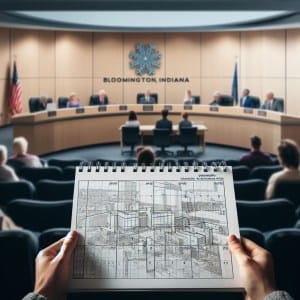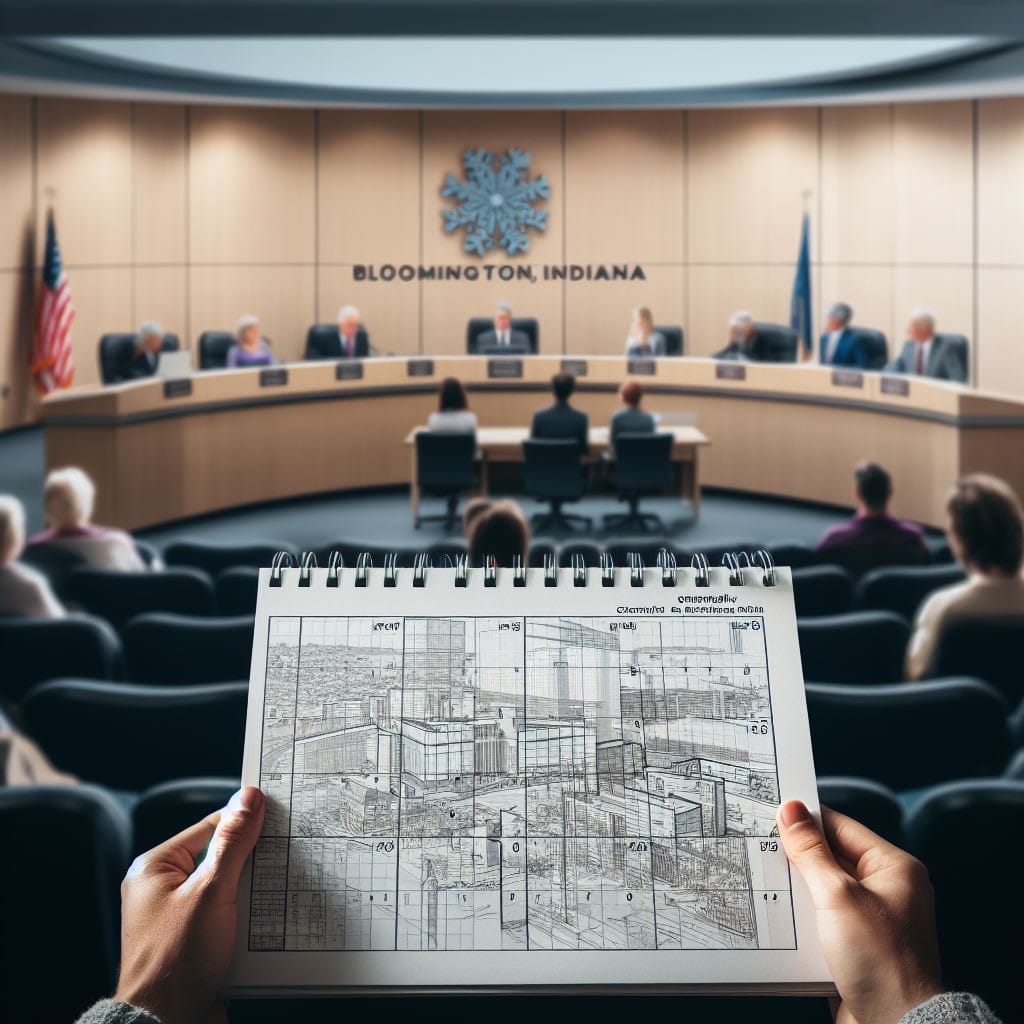Column: A better blueprint for Bloomington city council meetings

In the last four years, one of the more controversial decisions by Bloomington’s city council was the enactment of an ordinance to reinstall stop signs on 7th Street.

A measure of that controversy was Bloomington mayor John Hamilton’s veto of the decision. Of the three pieces of the legislation that have been vetoed by the mayor in the last eight years, the stop sign veto is the only one that was not overridden by the council.
The stop sign ordinance was a nice illustration of how the balance of power works, between the legislative and executive branches in local government.
But the ordinance was also a case study in the dysfunction that has plagued the internal workings of Bloomington’s city council for nearly the last four years—almost its entire term.
Just like better road design can lead to fewer collisions between vehicles, better city council meeting design might lead to fewer, and less damaging political collisions.
To see how, it’s worth reflecting on the legislative scheduling for the stop sign ordinance. Ordinance 23-23 was introduced at the council’s Sept. 20, 2023 meeting. On that occasion, nothing much happened.
Of course something happened. On Sept. 20, the council took its perfunctory vote on whether to ask the clerk to read the ordinance by title and synopsis only. But at that time, the council did not deliberate on the stop sign ordinance.
That’s because of a quirk unique to Bloomington’s local law—which prohibits deliberation on an ordinance when it is first introduced.
In the time between its first reading and the night of final enactment—complete with amendments first unveiled that same day—no public deliberations by the council took place on Ordinance 23-23.
Otherwise put, councilmembers gave residents exactly one opportunity to see them deliberate in public on Ordinance 23-23. And that means they gave residents exactly one chance to offer comments on it at a meeting.
In the adopted annual schedule for 2023, that one-time deliberation and comment for Ordinance 23-23 was a built-in feature. The regular legislative rhythm, which was laid out in the 2023 annual schedule, called for regular council meetings on the first three Wednesdays of the month, with no intervening or subsequent committee meeting slots.
In the 2023 annual schedule—in contrast to the plan for previous years—there were no scheduled opportunities for the council to deliberate a second time on an ordinance, at a committee meeting.
Historically, it was those intervening committee meetings—scheduled for weeks when the council did not have a regular meeting—that provided an extra chance for the council to deliberate in public on an ordinance, and for residents to weigh in at a public meeting.
From the time that the current set of nine councilmembers were sworn in at the start of 2020, there had been a clear consensus among them on one procedural issue. They agreed that it was an important benefit for residents to be able to watch the council deliberate at least twice on every ordinance, and for residents to be able to weigh in twice.
But they quarreled for three solid years about whether the intervening committee meetings on pending legislation should be ‘committee-of-the-whole’ meetings, or rather smaller four-member standing committee meetings.
So for 2023, the final year of the four-year term, the council adopted an annual schedule without a built-in provision for at least two occasions for deliberation in public. The 2023 schedule revealed something interesting about both sides of the council rift. Councilmembers apparently did not actually place that much value on deliberating twice in public. So the adopted 2023 annual schedule compromised away an agreed-upon public benefit.
It would be simple enough to engineer a different design for council meetings. Part of the blueprint would require scrapping the prohibition against any deliberations on the occasion of first readings.
Instead of voting on whether the clerk should read an ordinance by title and synopsis only, the president of the council could just read the title and synopsis. That reading would be performed based purely on the fact that an ordinance appears on the agenda.
What would a council’s first vote on an ordinance be about? Answer: The council’s first vote would determine whether an ordinance would be heard at a future meeting, for a second and final vote.
That would make the first vote substantive, and would give the council a chance to get its concerns out in the open early, before the final vote is taken, at least two weeks later.
If that kind of process had been in place for the stop sign ordinance, it’s possible that a veto could have been averted. The council could conceivably have arrived at a decision on stop sign reinstallation that had unanimous support.
The debate about what kind of committee should handle the intervening deliberations would become moot.
Of course, there is an obvious concern that might arise—about meeting length. For regular council meetings, all the legislation on an agenda would be up for discussion—first and second reading items alike.
One approach to the concern about meeting length would be to think hard about the architecture of agendas for regular meetings.
What if regular meeting agendas, for the first and third Wednesdays of the month, were confined purely to the council’s legislative business? Among the items that might be eliminated from regular meeting agendas would be: reports from the mayor’s office; and general public comment for items not on the agenda.
The idea would be to set aside the second and fourth Wednesdays of the month for some kind of combined city council working session and mayoral town hall.
Wednesday working sessions would be entire meetings specifically designed to hear from the public on general topics, and to hear from the mayor’s office on upcoming initiatives, or get updates on projects already underway.
Working sessions could even be occasions for the mayor to field general questions from councilmembers and residents.
The council’s annual schedule will be up for adoption at one of its two remaining meetings of the year (Dec. 6 and Dec. 13). Of the current nine councilmembers, five will not return in 2024.
So now would be a good time for the current council to reach out and consult with the five new incoming councilmembers, and mayor-elect Kerry Thomson, about the 2024 calendar.




Comments ()